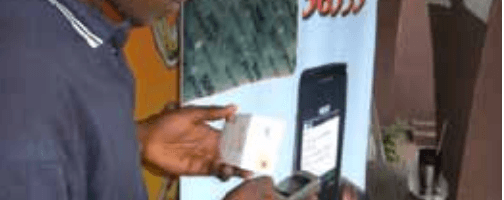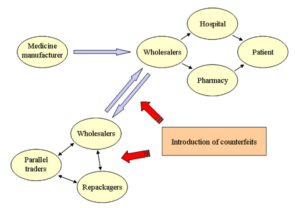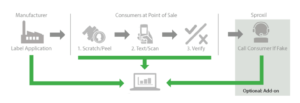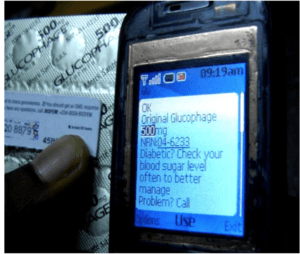Fighting the counterfeit drugs market, one text at a time

Sproxil is leveraging existing mobile phone technology in developing countries to empower customers to fight against the counterfeit drug market.
A market worth disrupting
In 2014, the global pharmaceutical market was estimated at $1.0 trillion and forecasted to grow to $1.3 trillion by 2018[1]. The market for counterfeit drugs is estimated to be $75bn[2], so not an inconsequential percentage of a very large market. Deaths that arise as a result of patients taking fake drugs is the biggest negative effect of counterfeit drugs. Counterfeit drugs are more rampant in developing countries where regulation is not as robust. According to a 2005 World Bank report, for many people in poor countries with weak regulatory systems, the likelihood that they are buying fake or ineffective drugs can be as high as 50%[3]. The number of incidences appear to be on the rise and is also becoming more rampant in developed countries as the internet has connected more buyers and sellers[4]. In fact, the world health organization estimated that over half the internet medicines sold in 2008 were counterfeit[5].
The global market for pharmaceuticals is incredibly intricate and comprises several entities in the supply chain. This makes it particularly susceptible for bad actors to insert themselves at different points in the chain[6]. I would argue that there are many other points in the supply chain, beyond what the arrows indicate in figure 1, where counterfeit drugs could be inserted.
Figure 1
Technology is creating new business opportunities: Sproxil, Inc.
Enter Sproxil, Inc., a company founded in 2009 with the aim of “empowering consumers to help combat drug counterfeiting with a simple text message[7].” Sproxil empowers consumers by reducing the middlemen in the supply chain and giving them direct access to the manufacturer. It does this by using the cell phone which is accessible my millions of people, particularly in developing countries where the need is greatest. Sproxil developed a Mobile Product Authentication (MPA) technology that can easily and effectively identify fake drugs before consumers even leave the pharmacy.
How Sproxil Works
- Consumers scratch a label on the packaging and text a set of unique numbers to a toll-free phone number to verify if a medicine is authentic (the number is identical on all cellular networks in a country).
- Customers instantaneously receive a text message back that indicates whether or not a drug is legitimate; saying “Yes, genuine” or “No, fake”.
- If a fake product is found, a consumer is given a hotline number to call in order to report the fake product, and the hotline operators then report it to the appropriate authorities in the country.
Figure 2
Case Study in Nigeria: Making the counterfeit drug industry unprofitable
Sproxil has partnered with large pharmaceutical companies like Novartis and Merck. In Nigeria, Sproxil partnered with BIOFEM Pharmaceuticals Ltd., an agent for Merck. In Nigeria, despite an overall increase in market share, sales through BIOFEM were falling as Illegal operations were leveraging BIOFEM’s brand name and reputation. After partnering with Sproxil, In less than three months there were scratch labels on over a million sachets, reaching 25 million buyers. According to BIOFEM, it has seen a return on investment of over 1000% less than three months after implementing the service.
Figure 3
There are other ways that BIOFEM is using the information they are gathering through MPA technology to enhance their business. First, they are using it for sales forecasting, targeted marketing promotions, and customer education. Second, BIOFEM can track the specific mobile network associated with an incoming text message. BIOFEM can begin to identify areas of the country with possible counterfeit activity. Finally, BIOFEM can offer product discounts, distribute product updates, and communicate any other information the customer may need to know[8].
Sproxil is expanding into other industries
The simplicity of the technology makes Sproxil applicable in many other industries. The company is using its MPA technology in the agri-business industry in Kenya to help farmers verify their products[9]. Sproxil is solving a true market need and creating value for both consumers and other players in the supply chain.
Word count: 792
Figure 1 Source: Degardin Klara, Roggo Yves & Margot Pierre (2013). Understanding and fighting the medicine counterfeit market. Journal of Pharmaceutical and Biomedical Analysis, Volume 87, page. 170
Figure 2 Source: www.sproxil.com
Figure 3 source: Sproxil Case Study: Biofem Pharmaceuticals Ltd. www.sproxil.com
[1] Global pharma sales to reach $1.3 trillion. http://thomsonreuters.com/en/articles/2015/global-pharma-sales-reach-above-1-trillion.html
[2] Sproxil Case Study: Biofem Pharmaceuticals Ltd. www.sproxil.com
[3] HNP Brief #2 (March 2005). Pharmaceuticals: Counterfeits, Substandard Drugs and Drug Diversion. http://documents.worldbank.org/curated/en/320051468135938535/pdf/321920HNPBrief120Pharmeceuticals.pdf
[4] Degardin Klara, Roggo Yves & Margot Pierre (2013). Understanding and fighting the medicine counterfeit market. Journal of Pharmaceutical and Biomedical Analysis, Volume 87, page. 169
[5] Degardin Klara, Roggo Yves & Margot Pierre (2013). Understanding and fighting the medicine counterfeit market. Journal of Pharmaceutical and Biomedical Analysis, Volume 87, page. 170
[6] Degardin Klara, Roggo Yves & Margot Pierre (2013). Understanding and fighting the medicine counterfeit market. Journal of Pharmaceutical and Biomedical Analysis, Volume 87, page. 170
[7] https://www.sproxil.com/defender/
[8] Sproxil Case Study: Biofem Pharmaceuticals Ltd. www.sproxil.com
[9] Sproxil Case Study: over 4,600 Kenyan farmers use mobile phones to avoid counterfeit products. www.sproxil.com






Akyaa, I loved this post! Thank you. It is very interesting how something as simple as a text message can have such an impact on fighting the counterfeit drugs market. My only question / concern is regarding the timing of the text message. Is the text message sent once the consumer has brought the drug? If the answer is yes, it is unclear how this can impact the drugs black market. In other words, how knowing that the drug is not fake, will help the consumer not buy a fake one next time?
What an awesomely simple solution to a really important problem! In thinking about digitization, it’s easy to focus only on the latest and coolest innovations. Sproxil shows the importance of focusing on making sure existing technology is adapted to fit applications in all corners of the world. And there are so many potential applications: beauty products, electronics, and packaged food, to name a few. But Sproxil’s real competitive advantage will come from its ability to harness data for use both in counterfeit intelligence and in marketing – I’m curious to see what they do!
Thanks for sharing this one Akyaa! I thought this was a really cool look at a company that’s doing some good in the world!
In terms of the power of this technology, I think that this is a huge customer acquisition opportunity for the company. In the digital age, it’s getting more costly than ever to acquire email addresses and phone numbers on customers. Sproxil can offer customers to be “opted in” to future communications and can use this as a way of distributing information on new drugs. Moreover, Sproxil can improve the customer experience by reminding them when it’s time to refill, sending additional prescription directions and informing customers on other potential actions to take to improve their health. All of these things would make the technology that much more appealing to pharmaceutical companies.
I am concerned, however, about how this technology works and how easy it is to replicate. For instance, if I was running a large counterfeit pharma ring, what would stop me from creating my own technology with my own phone number that says my drugs are real? Perhaps there’s something with authentication/ branding that Sproxil is doing to prevent this but this would be my one big area of concern if I was Sproxil or one of their customer pharma companies.
Thanks again for sharing- this was great!